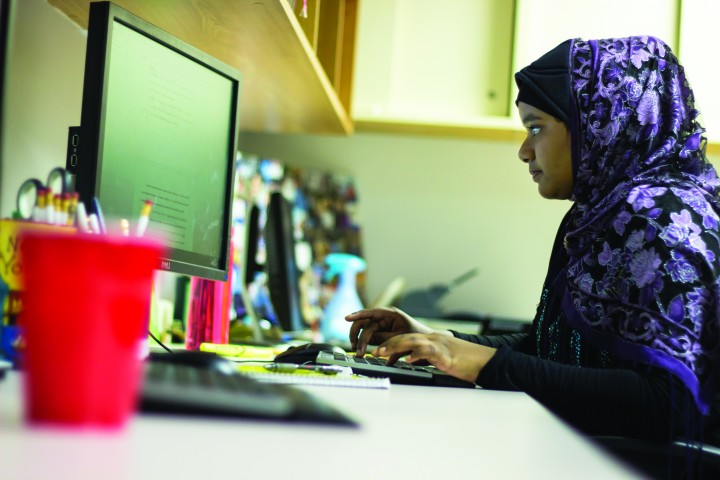USU program connects students and local refugees
Har Be Bar was 12 years old when she resettled in the U.S. from Burma. When her family first came to Salt Lake City, where she attended middle school, she had to learn a new language and experience a completely different culture.
“It was so hard,” Bar said. “The language, we don’t even know.”
Her family then moved to Cache Valley after finding employment locally. Now, six years later, Bar is in her second year at Utah State University with her sights set on becoming a math teacher.
Bar and her family are among an estimated 300 refugees living in the Logan. The Refugee GAP Program was created a year ago at USU to help refugees integrate into American culture by way of a student mentor.
This year there are six student mentors, or partners, paired with refugees in the area. Some USU mentors are assigned to college-aged students, high school students, or even married couples. Mentors assist their partners with English skills, citizenship applications, homework or anything else the mentee needs.
Luz Carreno is the AmeriCorps VISTA for Refugee Services at USU, coordinating the student and refugee partnerships.
“The ultimate goal that we want for this, though the goal is to help them get integrated…but we also want them to form a relationship, a friendship,” Carreno said. “That way both can learn from each other; the native USU student can learn from the refugee and vice versa.”
According to the U.S. Department of State, a refugee is an individual who has been forced to leave their home country due to a fear of persecution on the basis of race, religion, nationality, political opinion or otherwise. According to the American Immigration Council over 60,000 refugees resettled in the U.S. in 2009.
Resettlement agencies in Salt Lake City help refugees apply for Social Security Cards and food stamps, register for English courses and enroll in school or job training. Some refugees move to Cache Valley after this process to be closer to family or to find work. Employment opportunities at JBS, a beef company in Hyrum, brings many refugees to the valley. According to the Noun Project, almost every refugee family living in the area has at least one member employed by the company.
Carreno said most refugees living in Logan are from Burma and Myanmar; a smaller number come from Sudan, Eritrea and Ethiopia. Some, like Bar, attend intensive English language courses at USU, meant for those who speak English as a second language.
Bar has had two partners through USU’s program. This year Sarah Clark is helping Bar study for the U.S. citizenship test.
“It’s helpful for me and also for my English too,” Bar said. “Because (of) my American friends…I’m not afraid to ask questions.”
Lwan Bo, who is also a USU student, was born in Burma but spent the majority of her life living in a refugee camp in Thailand. When she was 15, her family came to the U.S. Now, at 21 years old, she plans to one day pursue a career in nursing. Last year Bo’s mentor through the Refugee GAP Program helped her with homework and English skills.
“It was kind of helpful for my homework and it’s made me feel better,” she said.
Bo said her schedule is too busy this semester for a partner, but would recommend other students get involved with the program.
“You learn a lot of new stuff, like how to have a good lifestyle and how to meet with other people,” she said.
Michael Hoggard, a junior majoring in economics, was partnered last year with David, a man from Eritrea. Hoggard assisted David with his USU application, but the two became very close friends by sharing each other’s cultures. From trips to Wendy’s for a Frosty to celebrating Eritriean holidays, Hoggard said his partnership with David was mutually beneficial.
“I learned far more about his culture than he did about ours,” Hoggard said. “It was a very enlightening experience for me.”
David never completed his college application and is now living in Texas, but his friendship with Hoggard is still thriving. Hoggard said because of the lessons he learned by spending time with David, it is a friendship that will last for a long time.
“(Through David) I learned about the power of optimism,” Hoggard said. “David was in a pretty rough spot; one of his sisters was in Sudan in a refugee camp and one of his brothers was in Ethiopia. But he somehow managed to be so optimistic and so loving. I also learned a lot about the meaning of family cross culturally…He would call me his brother all the time.”
Carreno said she hopes that students will become more aware of the refugees in Logan through the program and have the opportunity to learn from them.
“That’s another goal that we have with the Refugee GAP Program, to raise that awareness to make people know if the existence of the refugees here in Logan,” she said.
For students interested in becoming a mentor, a respect for other cultures is all that is needed.
“We’re not requiring they have this major or this background,” she said. “If you really want to learn about someone, you just have to have an open mind and be respectful. That’s really what we ask for because we want to raise awareness that there are refugees…As long as you’re committed and open minded and respectful about other cultures, you’re more than welcome to come help with that.”
To learn more about the program or to get involved contact Carreno at usurefugeevista@gmail.com.
-manda.perkins@hotmail.com
Twitter: @perkins_manda

